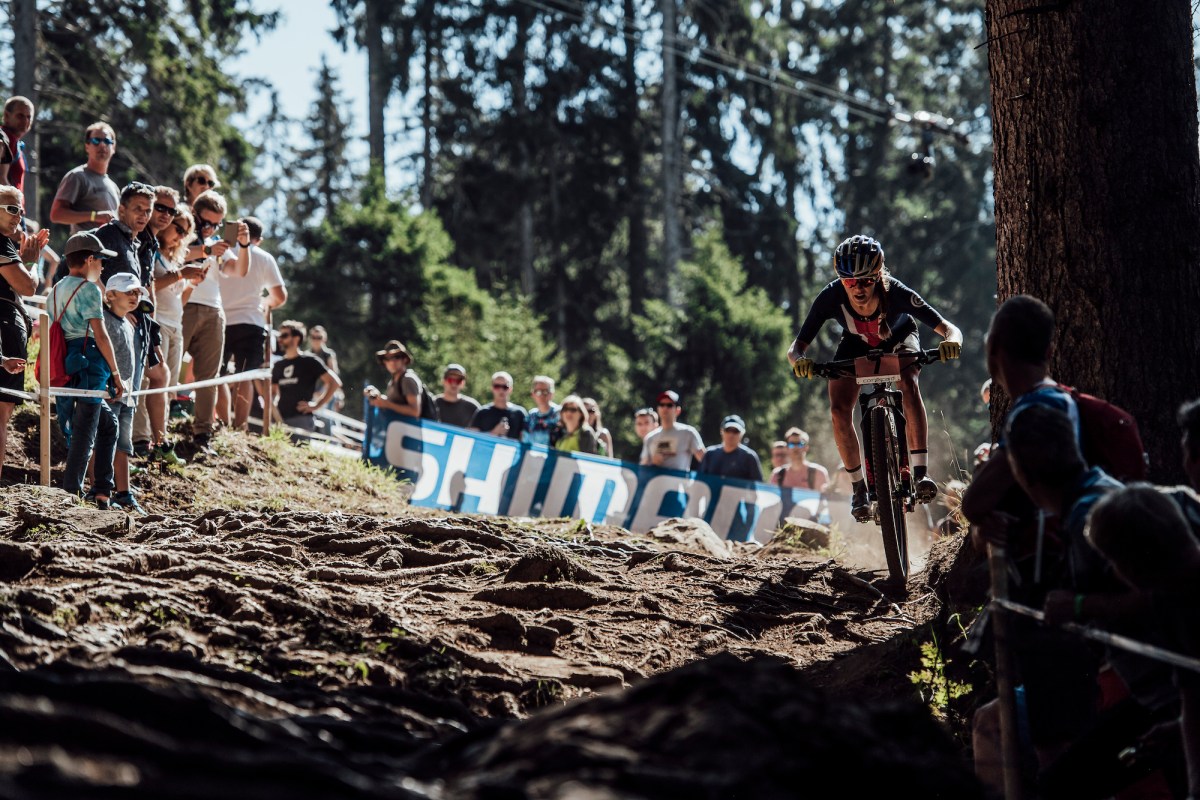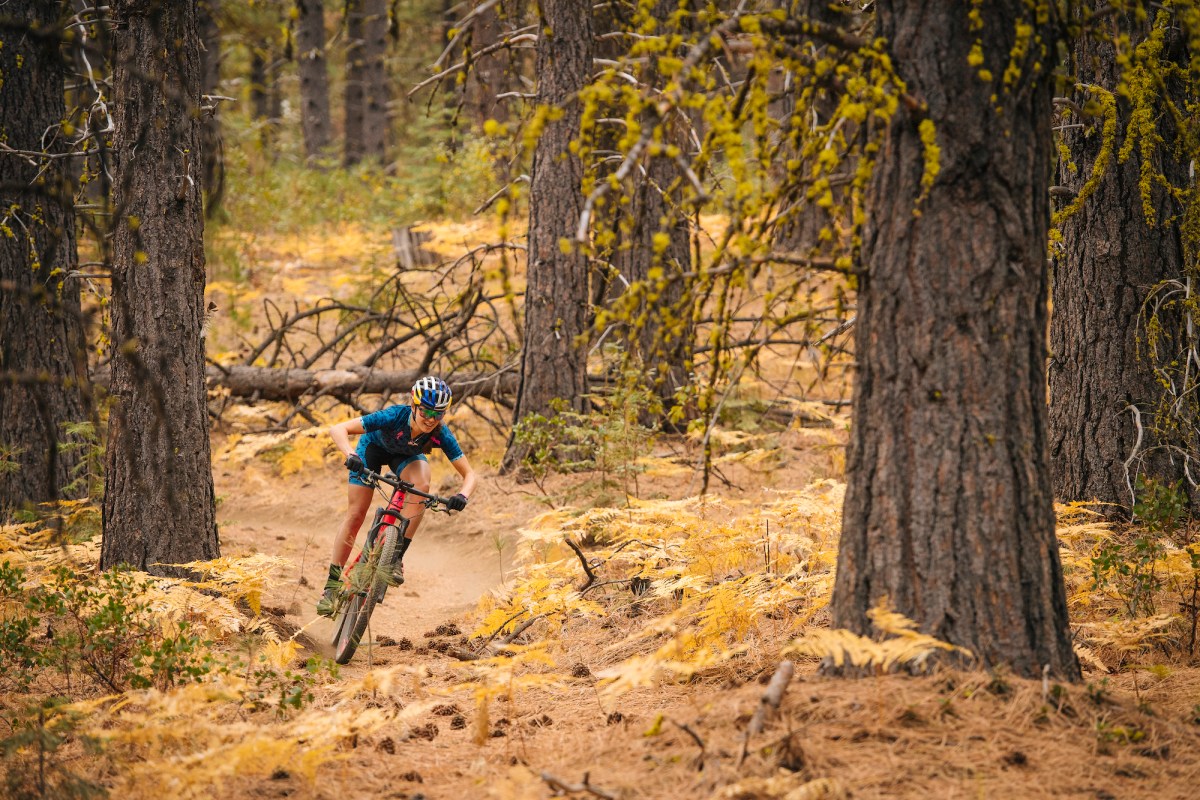Kate Courtney says she just has a particularly high level of grit.
That may be true, but it takes more than grit to top the podium. She won the women’s UCI Mountain Bike World Championships in Switzerland this fall. She ran away with the race in the last lap, only the fourth American woman to ever win, and the first since Alison Dunlap in 2001. The 22-year-old, who for the rest of the year will be wearing the rainbow jersey, the sign of the reigning world champion, accelerated to the top of her field through a combination of science, hard work and fun.
This is her first full-time pro-elite season, but Courtney, who grew up in Marin County, California, at the base of Mount Tamalpais—where, she is quick to mention, mountain biking was invented—has been racing in the U.S. and internationally since high school and has raced for the Specialized team for five years. She’s the product of a good high school team and the National Interscholastic Cycling Association (NICA) program. And a family who took her riding from a young age—her dad is still one of her favorite riding partners.
“My first Word Cup trip was when I was 16,” she says. “I was supposed to be sent to a local European race with juniors but plans got screwed up, and I was sent to junior World Cups. The next youngest person was six years older, and they were all guys.” She says the international courses were much more technical, and the competition was much higher than what she was used to. In her two races during that trip, she placed top 10 in one and crashed out in the other—the only race she’s ever not finished—and she says the combination of feeling both slightly successful and way out of her league sparked a fire to try to be on top of the world that she’s been chasing ever since.

Photo Credit: Bartek Wolinski/Red Bull Content Pool
Courtney says she likes both the physical rush of pushing herself and the mental challenge of technical mountain biking. She won Worlds this year by passing second-place Danish rider Annika Langvad, who had been leading the whole time, in a late-stage rooty section. Courtney stayed on her bike through the technical, off-camber slope when Langvad dismounted, and then sprinted to the end, finishing nearly a minute ahead.
Courtney’s grit—her drive and deep physical ability— is backed by a heavy dose of hard work and a highly scientific mindset. A self-proclaimed data nerd, she spends a lot of time looking at her stats, reviewing her power numbers and her athletic performance, and trying to tweak every aspect of her performance, from her sleep to her taco consumption, to maximize her results. “In terms of skills, I definitely have strengths and challenges,” she says. “I’m good at short punchy climbs, and am working on getting better at longer ones.”
She’s had some practice with both science and balancing goals. She finished a human biology degree from Stanford while she was racing, which required a different kind of dedication and endurance. “I became more serious about cycling when I was in college so that balance got harder,” she says. “But it taught me to prioritize, and realize that sometimes I won’t always be perfect in my training, and sometimes there will be other stressors, but that’s OK.”

Photo Credit: Paris Gore/Red Bull Content Pool
Competing at a high level for most of her adult life has come with victories and challenges: She won the U23 Worlds in 2016, but failed to qualify for the Olympic team that year. She’s had to teach herself how to rest and to give herself breaks, and she says she’s learned from that as well. She knows she’s happiest and most successful when she’s having fun, and part of why she loves racing is the joy she gets from riding bikes.
Balancing academics and athletics has played out in her professional career, too. “I think the bio degree is super helpful because I can really understand what all my experts are telling me on the bike,” she says. “It’s really helpful in terms of being a lifelong learner. I think of myself as being student of the sport. I’m a nerd of the bike.”
For all her rigor, she also tries to keep things fun. She makes goofy videos with her bike mechanic, Brad Copeland, and she’s been known to break into rap. “I do a lot better when I’m joyful in what I’m doing,” she says. “Some people interpret that as not being serious, if I’m laughing at the start line, but my inner circle knows that I perform best when I have everything dialed and then can relax.”
On race day that translates into comfortable pre-competition rhythm. “I’m kind of ritualistic and I like to have a system in place,” she says. “My pre-race meal is always the same, I meditate and lay out my clothes. I have a really specific warmup, and I leave the hotel at the same time, so that I can just think about what I have to do.”
She says that bike racing checks all her boxes—it’s social and fun and challenging in all the right ways. Part of the excitement and challenge of competing on the World Cup is that there are so many women riding so well. “We consistently have a really high level of competition,” she says. “On the best day I could be the best, but the level is so high that there’s a handful of girls who could win on any given day.”
Now that the season is over, she’s going to return to California. She’ll take two full weeks off the bike, but her mind is already on next season and how to keep progressing while still having fun.
